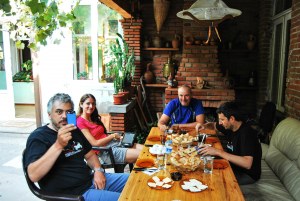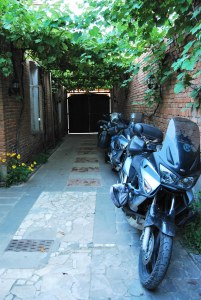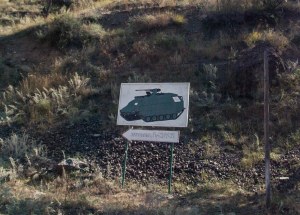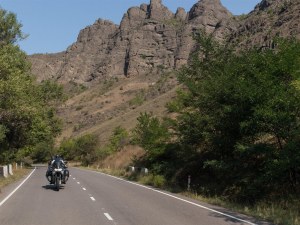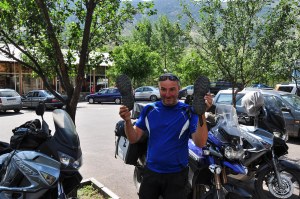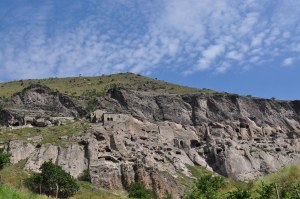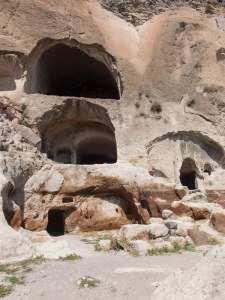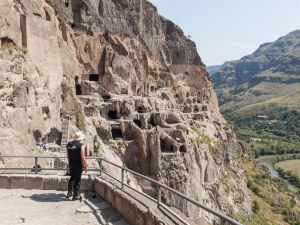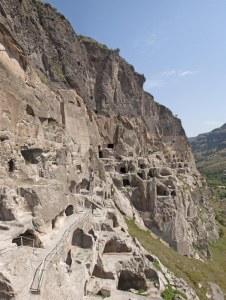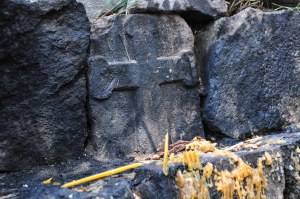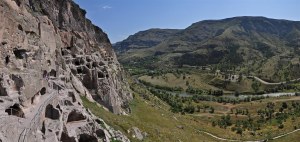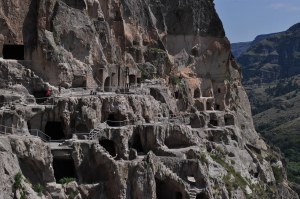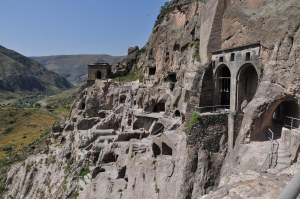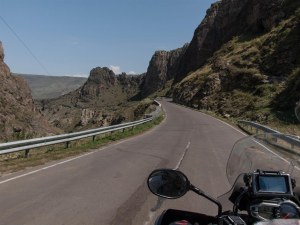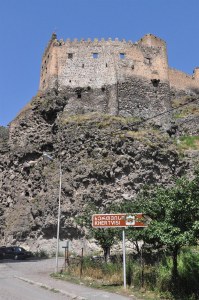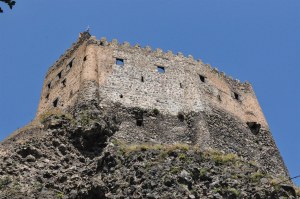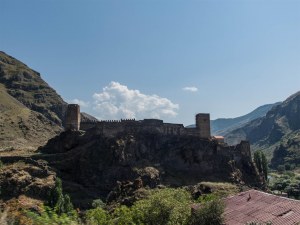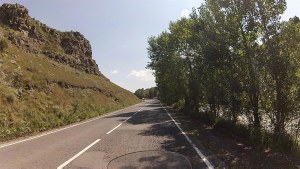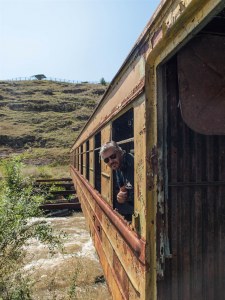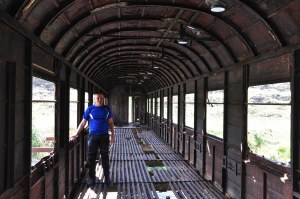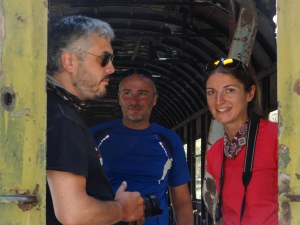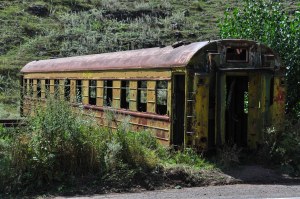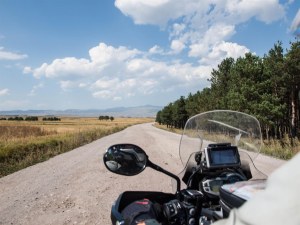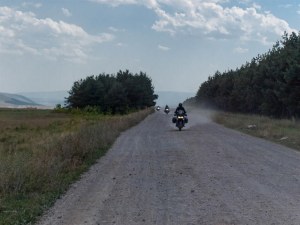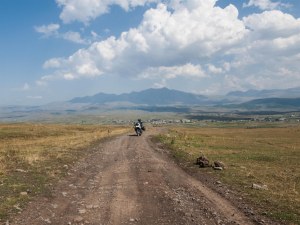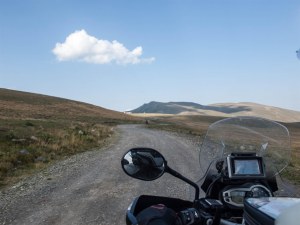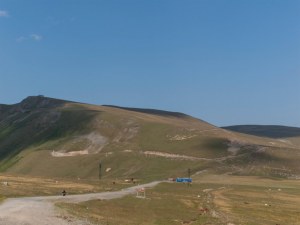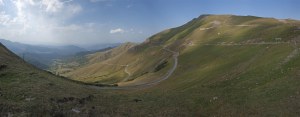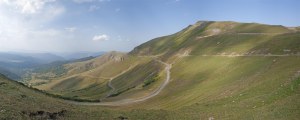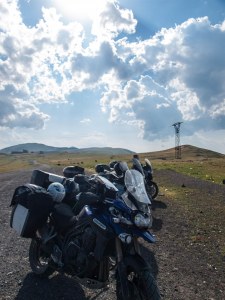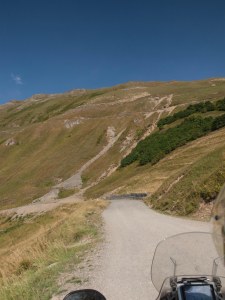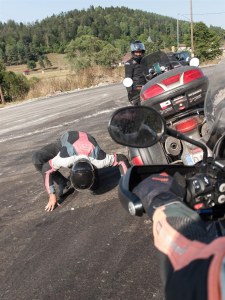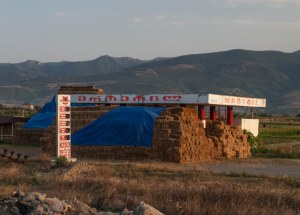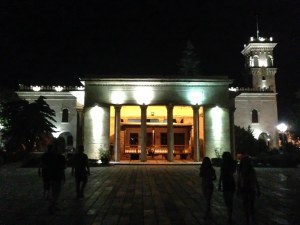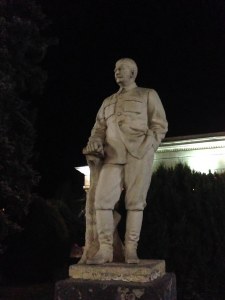Where is the tarmac
Early in the morning with cost of 10 Lari (~ 5€), we are ahving a hearty breakfast with local produce in scenic wooded courtyard. We load the bikes and leave to cover a route that we knew that would include some km of gravel, but we did not know what was awaiting us... But first we filled our tank with 1€/lt... enjoyment. Since we talked about fuel, i would like to report that almost all stations accept card and that 95oct is called Premium. There is also 92 which most use, so insist on Premium.
At first we are moving at an altitude of 1200m, in a route with a lot of vegetation, while the imposing river Kura, which springs in Turkey, runs through Georgia and Azerbaijan, to meet the Aras River and flows into the Caspian Sea. The serpentine path is true beautiful, but is full of trucks and puddle. But the potholes are pitfalls as asphalt is mostly fine and suddenly appears a well... Like yesterday...
Also pay great attention to cows that circulating freely on the roads ... Having led around 30km. we reached the crossroad of the village Khertvisi, with the well-preserved castle towering over the city. Since we will return the same way, we left it for later and we continued to visit the caves of Vardzia.
We cross an impressive gorge again alongside the River Kura, to reach the parking below the caves. We parked, changed clothes quickly as the thermometer reached the top and go to watch the caves. We pay 3 Lari for input and 1 Lari for the van that takes you to the entrance of the caves. Van is "inestimable value". You get a big dose of what does driving in Georgia means, if you survive of course...
The story begins more than 800 years ago, in the late 12th century, when a 25 year old woman with the name Tamar took the ruling of Georgia. Just one year after her coronation, Tamar wanted to build a monastery, as a sign of her Christian faith. There was however a big problem as the Mongols, based on Asia, had started wars with neighboring nations seeking to expand their empire. So they were a constant threat to the country. For this reason, the queen decided to build the monastery under the earth, so it can also be a shelter from raids to the residents of the surrounding areas. Its construction began immediately, beneath the mountain Erusheli, which was chosen for its hard rock which could withstand the works.
There were built 13 levels, while the natural caves that were inside the mountain expanded and converted into more than 6,000 rooms which were enough to accommodate both the monks of the monastery and the residents who will hide there to escape from the attackers. The land around the monastery was extremely fertile and offered everything to those who lived there. At the same time, the monks built a complex underground network of paths for transporting food and water inside the caves. The underground monastery for about 100 years achieved the purpose for which it was constructed. He kept local residents safe from the Mongols, since the only way to get one there was an underground tunnel leading from a nearby river, which the attackers never discovered.
The fate had a bad end for the city of caves. In 1283, nearly a century after its construction, a large earthquake brought the destruction. Its power was such that caused landslide to the mountain Erusheli. The one side literally collapsed, destroing most of the caves and paths. More than the half of the underground city was completely destroyed and what is left of it could not be used as a shelter, as most were in plain view on the mountain surface. The caves were abandoned a few years later and remained desolate until the 20th century when some monks visited them and decided to reuse them as a monastery. Today, most of the caves are used as a museum, while a small part is still inhabited by monks.
Our tour ended and we return to the main road making a stop beneath the imposing castle Khertvisi. It dates back to the 2nd century BC and is the oldest castle in the country. It is built at a strategic point above the town, at an altitude of 1126m and above the confluence of the rivers Kura and Paravani. The legend says it was destroyed by Alexander the Great. Some photo and continue alongside the river Paravani. Beautiful track, which hosts a strange sight: The wagon is in very bad condition, rotten everywhere and great care is needed if you try to walk it like us
After few kilometers, -and about 1-2 km before entering the town Akhalkalaki-, we turned left and basically we are in a huge straight onto a vast plateau. We are at an immense plain, while the altitude exceeds 1700m. Large meadows -Some agricultural or other not- spread around, and there are some reforested parts. On bare tops we can distinguish forest sections, like patches in an environment where the only vegetation is alpine grass!
At the entrance of the village Aragva, the paved road ends. A taxi driver, who comes across, asks us where we are going. "Bakuriani" we answered and shows us the right direction. From the information we had the particular road (about 45km) passing through the passage Tskhratskaro, at 2454m. altitude was all dirt. Some few references on the internet said it was a passable gravel road, such easy that even a Harley could cross! Based therefore on this information, we started to cross it...
At first is passable, but as it goes on is getting more difficult. We make over 10 km and the road has become a mess. Like an old Roman Road with stones putted to the ground. As we are not sure we asked some shepherds who assured us that we are going well. However the scenery is really beautiful, but our eyes cannot get off the road. Fortunately there are photos of Natasha to admire afterwards. We run 10 more hard km and we see a car with tourists coming down from the direction we are going to. Asking them they answered that the peak is still 10km. And that the rute is the same mess. We decide to continue…
Finally we reach the top where is a police outpost and stop us for control! In the middle of nowhere! At first I thought they did it just out of curiosity, but -as we saw- did meticulous control, cross-checking our passports through phones with their colleagues. Spend more than 30 minutes to finish with the bureaucracy…It was a delay, but at least the view is fantastic... On the slope beside us passed a flock of sheep. The biggest I've ever seen...
After finished with the control we continued through a passable dirt road to the village of Bakuriani. And after 15 more km on gravel, asphalt finally appears at the village entrance. Such was our pleasure that Manolis get of the bike and kiss the asphalt: The route Bakuriani - Borjomi - Khashuri, is full of turns and within lush vegetation, which makes driving enjoyable.
Unfortunately is not the same from Khashuri onwards, where the traffic increases considerably and the scenery is immaterial. Moreover, we must be attentive as drivers are not at all careful and fatigue makes our reflexes most vulnerable. Slowly we get to Gori where we choose to spend the night. As we are looking for hotel we found a hostel named California (20 Lari, ~ 9 € / person). The property is located in the historic city center, where is taking place a major renovation of buildings and roads. Although everything is very nice and neat, little people circulate.
As soon as we reach the hostel, a plump lady with strange haircut, comes out to greet us. Does not speak English (although called the hostel California) and our conversation is primarily by meanings. We take a look at the rooms include a large clean room with 5-6 bunk beds and shared bathroom. Nor bad but we want to see what other options are in the city. I made a few more accommodation in navigator and I leave with Natasha to check them while the others are waiting for my signal. But as we looking all we find is a shabby hotel which does not seems good. Having no other choice we get back in California hostel where the owner has phone a friend of her that speaks Greek, so we can understand each other.
We put our things on the room where on a bed is an Austrian. After the formal recommendations tells us that he left his country to go to India on foot, just with a small bag! Excited, we tell him: "What are you doing is very difficult. Bravo! "And he answers disarmingly:" What you are doing is more difficult to drive so many miles! I use public transport and just sit without getting tired. Bravo is for you". Here we realize the different way in which someone receives what someone else might consider as ‘ordinary’... We take a bath and start to go to eat, to the city center.
The city is the birthplace of Stalin and the village square is the main attraction of the city, a museum dedicated to him. Previously there was a huge bronze statue, height 6m, but after the fall of the USSR demolished in one night... In front of the museum is an oblong square, which is flooded with people. Young, old men and children have been scattered in various places enjoying the evening dew, playing,talking ... In the countries of the former Eastern Bloc often encountered this kind of habit. The residents use and enjoy their parks, which may constitute a part of their socialization.
The history of Gori starts from the Bronze Age and is rich, being in a historical - trade route has been in contact with many people. Armenians, Mongols, Caucasian tribes, Ottomans with last Russians are some who lived in this region. For many years it was under Russia while in 2008 was its last historical adventure. In the war of South Ossetia in 2008, was under air attack by the Russian Air Force, which resulted in injury and death of citizens of Gori. The administration and many residents left the city, which was occupied by the Russian army without any resistance until withdrawn 11 days later, leaving much damaged properties. In fact at the internet exist a photo of a rocket be intact in the bedroom of a house!
We continue our walk on the square, along which there are large and imposing but in bad condition- buildings of Russian type. Behind the museum, in a narrow alley, there is a restaurant called "Old Gori". Based on the information we have from a friend Achilles, there works a lady -named Marina which speak Greek as she have stayed 14 years in Greece. Looking outsude the shop, the young waiter, asked to help us. We asked him about the existence of someone called marina, but he answer negatively. However because it was late, and as the restaurant looked traditional we decided to sit there.
We descend the stairs to reach the central room of the restaurant. We order with the help of the waiter who although does not speak much English did everything to serve us. The food was delicious once again. Finally this country has delicious food, regardless of our choices.
Eventually we decided to ask for the bill to return to the hotel. The food is very cheap, as there comes no more than 6 € a person with all that we had ordered. Natasha looking at the list of what we ordered –written in Georgian- says for fun: "... here writing more of what we got ...". At that moment, a plump lady who was behind the counter, answer the Greek "It's what you ordered ... Then we realize that we are in the right shop! After joking a little, soon learn that the lady is the sister of Marina which appears in a moment. She is very pleased that meet us and her face shining as it starts talking about the years living in Greece. Despite the difficulties it is obvious that she has Greece as her second home and she is eager to return.
We sit for a while with her as she tell us stories from her life, the work that she has done in Greece, the feat to pass each time the border, as the Georgians cannot easily get a visa to Greece, and how is someone living illegally in another country. The way she describe the facts show us a person with great fortitude and sense of humor which win us. Time passes and some time, while the shop has been closed , we say goodbye. Maybe we meet tomorrow as the morning we are going to visit the museum of Stalin, which is located a block away from the restaurant.
Gori generally gives us the feeling of a looser town and less "dangerous." We didn’t found many drunks on the streets as the night before. Perhaps it has certainly to do with familiarity in the area and people. In any case, the city gave the impression of a quite interesting place although it seemed to be indifferent at first.

